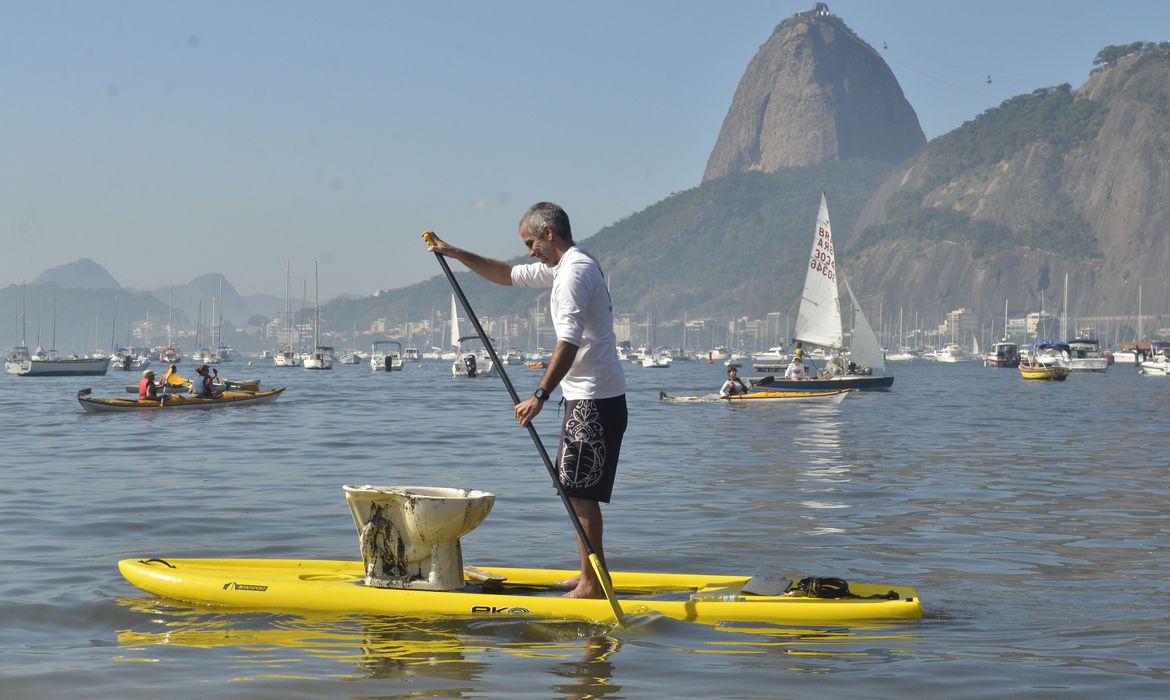RIO DE JANEIRO, BRAZIL – According to a survey conducted by ABCON (Brazilian Association of Private Concessionaires of Public Water and Sewerage Services), the equivalent of 450 Olympic swimming pools of sewage are released every day in Guanabara Bay alone. In the state of Rio de Janeiro, only 37% of people have access to sewage collection.
On December 1st, corporate entities sent Rio de Janeiro acting governor Cláudio Castro a manifesto urging the approval of CEDAE (Rio de Janeiro State Water and Sewage Company) public bid notice, which provides direct private investments of R$31 billion (US$6.2 billion) in basic sanitation, plus at least R$10.6 billion in grants to the state and municipalities and a plan to universalize water and sewage for 13 million Rio de Janeiro residents in 12 years.
The document “Rio de Janeiro cannot wait” was also sent to other state authorities, such as the president and the leaders of the state Legislative Assembly, in addition to the state’s federal senators and deputies, President Jair Bolsonaro, and ministries linked to the sanitation and environment area.

ABCON signs the text jointly with FIRJAN (Industry Federation of the State of Rio de Janeiro), CBIC (Brazilian Chamber of the Construction Industry), ABDIB (Brazilian Association of Infrastructure and Basic Industries), ABIMAQ (Brazilian Machinery Builders´ Association) and ABEMI (Brazilian Association of Industrial Engineering).
“The bidding for the concession of part of services currently provided by CEDAE may address this massive deficit in sewage collection and treatment in a little over a decade. The public notice prepared using the BNDES design is pending only the government’s decision to be published. Deferring the public notice will cause great harm to the population,” says Percy Soares Neto, ABCON’s executive director.
Percy adds that the bidding does not represent a privatization nor will it undermine the CEDAE.
“On the contrary: an analysis conducted by ABCON estimates that CEDAE will have revenues of about R$2.5 billion per year with the competition, and if well managed it will be fully able to recover the company’s liabilities without encumbering the state of Rio de Janeiro treasury,” he said.
On the other hand, some defend the same cause, but with other ideas. According to Sérgio Ricardo Verde, ecologist and founder of the Baía Viva Movement, municipal governments must meet goals established to tackle the problem.
“Crivella, the current mayor, last year launched the City’s Strategic Plan, a plan of goals legally required, but, as incredible as it may seem, this plan does not mention the word Guanabara Bay. And it is 197 pages long. I challenged this and I was told that the current mayor did not take responsibility for the execution of the Basic Sanitation Municipal Plan, which is set forth in law 11445.”
“In practice, in regions like Rio de Janeiro, where a state-owned company (CEDAE) is operating, investments must be made by both the company and the municipalities and, even today, the city halls and city councils do not release funds for the plans to get off the ground, they do not annually approve the funding for sewage treatment. Moreover, part of Rio de Janeiro’s basic sanitation is already privatized.”
“In 1990, sewage treatment in Niterói and the Região dos Lagos (Lakes Region) was privatized. In 2007, the city government privatized AP5, an area in the West Zone, which is now managed by Odebrecht. After the denunciations on this company, a Canadian group became responsible for AP5. The City Hall wanted to privatize the AP4, the Barra, and Vargens region, which is very profitable for CEDAE. However, it did not proceed further. Crivella wants privatizations, which is why he refuses to implement projects that are obligatory by law,” Sérgio emphasized.
He also adds: “In 1995 the Guanabara Bay Clean-up Program (Pdbg) was created, but to this day it has not been fully implemented because the collecting mains have not been installed, so the pollution is still being dumped into the bay untreated. There is also the PISAM – Municipal Sanitation Program. Under the PISAM, in 2011, the state government of Rio de Janeiro pledged to clean up 80% of Guanabara Bay. In the scenario of the Olympic Cycle. But it was misleading propaganda.”
A study conducted by Casa Fluminense, an organization that analyzes official data from the Metropolitan Region of Rio, an average of 2,500 hospitalizations are recorded per year due to diseases caused by the lack of basic sanitation in the state.

